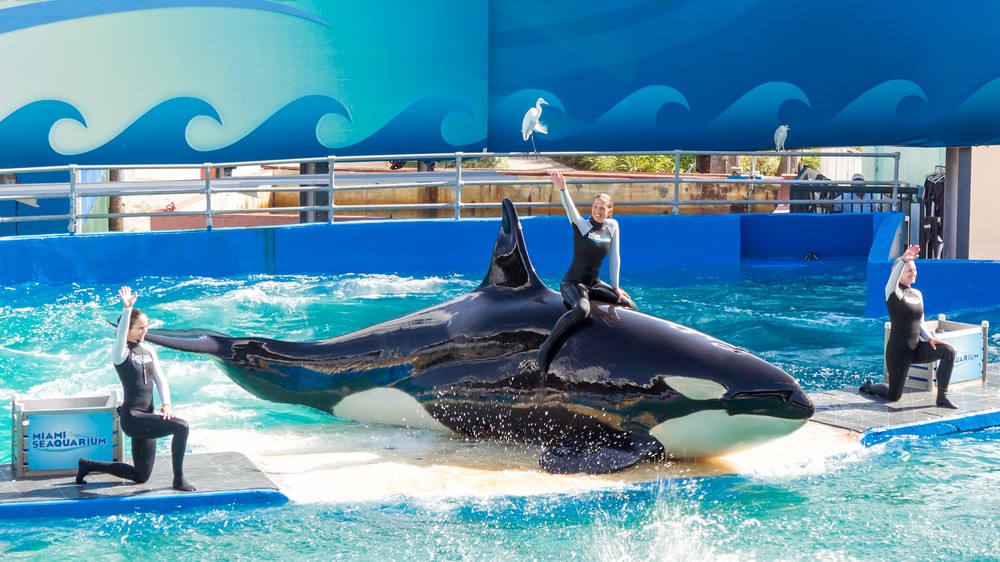Lolita, the 2nd-oldest orca in captivity, who was set to be released to the wild, has died
Lolita, also known as Tokitae, died before she could be returned to her native waters in the Pacific Northwest.

Editor's note: This story was originally published on April 4, 2023, but was updated on Aug. 21 after Lolita died.
Miami Seaquarium's star orca, Lolita, who has spent more than 50 years in captivity, died on Aug. 19. She was set to bid adieu to her tiny tank in Florida and live out the rest of her days in her home waters of the Pacific Northwest, but died before she could be released, according to a statement. She received medical care after displaying signs of discomfort for several days. Her keepers suspect that Lolita's death was linked to a renal condition, but this is not yet certain.
Lolita, also known as Tokitae — the Coast Salish people's word for 'nice day, pretty colors' — or Toki for short, was a 57-year-old female orca (Orcinus orca) from the now-endangered Southern Resident orcas that live off the coasts of British Columbia, Washington and Oregon. At the time of her death, she was the second oldest orca in captivity behind Corky, a 58-year-old male who resides at SeaWorld San Diego.
Lolita arrived at Miami Seaquarium in 1970 after a group of men captured her and 79 other orcas at a cove on Whidbey Island, Washington in one of the largest and most widely condemned orca-capture events in history, according to The Guardian. Lolita spent much of her life performing tricks in an aquarium pool, which is the smallest of its kind in North America. In March 2022, she was retired from public shows, according to the U.S.-based non-profit organization In Defence of Animals.
The decision to relocate Lolita to her home waters was announced March 30 at a press conference jointly held by The Dolphin Company, which owns Miami Seaquarium, and the conservation group Friends of Lolita, who had campaigned for Lolita to be returned home since she retired. Lolita was too old to be successfully released into the wild, so the organization had planned to move her to a new sea pen, according to a statement released at the time.
Related: Inbreeding may be causing orca population in the Pacific Northwest to crash

In the wild, the average lifespan of female orcas is 46 years, but some can live for up to 80 or 90 years, according to the U.K.-based organization Whale and Dolphin Conservation (WDC), while the average lifespan of males is only 30, although some can live for between 50 and 60 years. However, captive orcas rarely live this long.
Sign up for the Live Science daily newsletter now
Get the world’s most fascinating discoveries delivered straight to your inbox.
It is rare for captive orcas to be returned to the wild. The only captive orca from North America to be released into the wild was Keiko, who famously starred in the 1993 film "Free Willy." Keiko was released in 2002 after a massive petition for his release, but he died from pneumonia in the waters of Norway in 2003, which sparked fears that orcas could not be reintegrated into the wild. But in the BBC documentary Frozen Planet II, a formerly captive orca from Russia was filmed hunting and playing with a pod of orcas, which suggested that full integration into the wild is possible.
Keeping orcas in captivity is highly controversial. Since 1961 when the first wild orca was captured, 174 orcas have died in captivity, which doesn't include the 30 miscarried or stillborn calves from expecting captive mothers, according to WDC.
Those that survive have a poor quality of life and can suffer from a wide variety of health problems, such as dorsal fin collapse (particularly among males) and tooth damage, according to the nonprofit Dolphin Project. Captive orcas also have behavioral impacts due to isolation from other orcas. The cooped-up cetaceans can become depressed to the point that they self-harm or become highly aggressive toward other orcas and their human handlers. So far, four people have been killed by orcas in captivity, three of which were killed by the same male orca known as Tilikum, according to the Dolphin Project.
On March 9, Canada's last captive orca Kiska, nicknamed "world's loneliest orca," died after more than 40 years in captivity, Reuters reported. During this time, she saw all five of her calves die before they reached 7 years old.

Harry is a U.K.-based senior staff writer at Live Science. He studied marine biology at the University of Exeter before training to become a journalist. He covers a wide range of topics including space exploration, planetary science, space weather, climate change, animal behavior and paleontology. His recent work on the solar maximum won "best space submission" at the 2024 Aerospace Media Awards and was shortlisted in the "top scoop" category at the NCTJ Awards for Excellence in 2023. He also writes Live Science's weekly Earth from space series.









